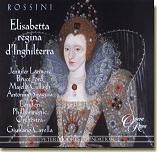This was the first opera Rossini composed for the Teatro San Carlo in Naples starring the remarkable Isabella Colbran. In fact, all four main roles–Elisabetta, Matilde, Leicester, and Norfolk (two sopranos, two tenors)–were composed for virtuosi. The music is very florid and the tenor parts are peculiarly high. The opera has been recorded before (by Philips, in 1975), with Caballé, Carreras, Valerie Masterson, and Ugo Benelli, and that recording has much to recommend it, not least the astonishingly beautiful singing of Caballé and Carreras, then at or near their peaks. But this new set supersedes it with sheer theatricality and Rossinian style.
When the music is sung this well it is easy to understand the dazzling reaction the opera got at its premiere. Jennifer Larmore sings Elisabetta, and casting a mezzo in the role was a fine decision. Elisabetta’s anger and determination are presented fiercely, and since much of the role is composed for the middle voice (with some high-flying moments), it sits perfectly for Larmore. She always has been somewhat of an aggressive singer, and here it’s apt. She can call up some real tenderness when she needs to as well, and the coloratura holds no fears for her–it’s a brilliant performance.
Majella Cullagh sings the role of Matilde (in this opera, which bears little resemblance to history, she is Mary Stuart’s daughter and the wife of Leicester, with whom Liz is in love), and she handles the high tessitura well and makes what she can of the role. Her duet with Larmore in Act 2 is ravishing. Bruce Ford’s Leicester is heroically sung. He has both the agility and the top notes to do the role proud. Antonino Siragusa, in the even more challenging role of the villainous Norfolk, gets all of the notes right, but his voice lacks the bite the part needs.
Giuliano Carella leads the orchestra and chorus in a tightly run show. This is very exciting indeed–and it’s fun to spot the places where Rossini borrows from himself. As usual with Opera Rara, the accompanying booklet (158 pages!) contains fascinating notes, with full texts and translations. No fan of great singing or early 19th-century opera should be without this.
































